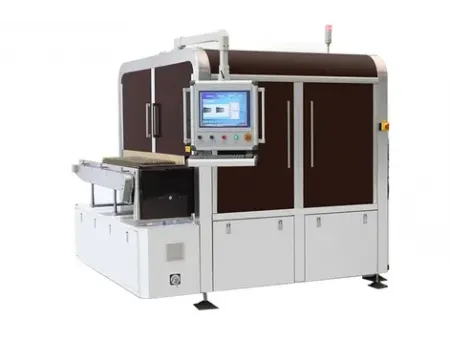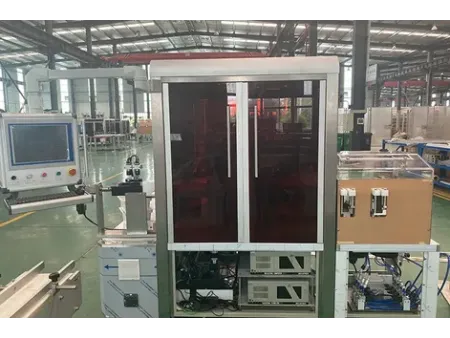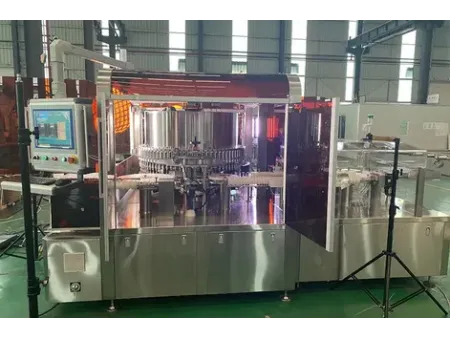Automatic Ampoule/Vial Inspection & Leak Testing Machine
JAYL Combination of AVI and CCIT
- Speed: 600pcs/min (max.)
- Applicable container: 1-20ml ampoules, vials, oral liquid bottles, etc.
- Accuracy: visible particle size ≥50μm (adjustable), leak detection ≥0.1μm
- Power: 9.5kW
- Voltage: 380V, 50Hz
- Worktable height: 900±40mm
- Machine dimensions (L×W×H): 3920×2074×2000mm
- Machine weight: approx. 3500kg
- Supports continuous inspection at speeds ranging from 200 to 600 pieces per minute, with a detection sensitivity of ≥50μm
- Utilizes the Knapp test method for detection performance verification, meeting both FDA and EU regulatory requirements
- Fully equipped with a servo drive system and a user-friendly HMI interface, allowing audit trails of all user operations, parameter changes, and production data
- Incorporates globally recognized components such as Basler cameras from Germany and a complete Mitsubishi control system, including PLC and servo motors
- Combines vision-based inspection algorithms with high-voltage leak detection technology for comprehensive ampoule and vial quality control
Ideal for inspecting visible particles such as glass shards, fibers, hair, white spots, and other foreign matter in injectable ampoules. It also checks for fill level accuracy and detects leaks caused by microcracks or pinholes. Additionally, the system can be used for oral liquid vials and water-based injectable solutions in small vials (such as lyophilized vials).
- Every motion of the inspection unit is controlled by a full-servo system, built upon patented innovations with independently held intellectual property rights.
- Visual inspection for particulate matter is validated under Knapp standards, ensuring consistent detection of contaminants like fibers, glass shards, white particles, and other visible defects.
- High-voltage microleak detection uncovers defects such as pinholes and microcracks that standard vacuum or dye-based methods often miss.
- High-precision CNC machining is used for key mechanical parts, while control components, such as Basler cameras from Germany and a complete Mitsubishi PLC and servo motor suite, ensure reliable and efficient performance.
- Inspection and rotation assemblies are mounted on the top deck, shielding sensitive parts from product spills and cleaning agents, which simplifies maintenance and prevents system failures.
- Format changes are quick and convenient due to the tool-free design. The servo-controlled carousel lifts streamline adjustments when switching between vial sizes or product types.
- The infeed section uses a non-equidistant screw design, making the unit suitable both for standalone operation and for seamless integration with upstream and downstream production lines.
- Needle-type electrodes based on tip discharge principles deliver precise and effective leak detection across various defect types.
- Inline inspection is performed on every ampoule or vial, covering all surfaces and ensuring full 360-degree detection during continuous production.
- The high-frequency, high-voltage power supply, developed in-house, ensures minimal energy transfer, short exposure time, and low current levels, avoiding any risk of product degradation or secondary contamination.
- Built-in safety features include fault alarms, real-time fault display, interlocking door-stop function, ozone catalysis system, and electromagnetic shielding.
- All inspection data can be stored, uploaded, and printed, supporting traceability and compliance with pharmaceutical quality standards.
The full inspection and leak testing process for ampoules, bottles or vials follows these steps:
- Infeed
- Bottle separation via feed screw
- Bottle alignment by star wheel
- Vertical pressing
- Rotational movement for inspection
- Braking
- Image capturing
- Image analysis
- Transfer to leak testing section
- Secondary alignment via non-equidistant screw
- Leak detection and result classification
- Sorting into accepted/rejected channels by star wheel
The combination inspection and leak testing unit rely on two synchronized technologies. For visible particle inspection, ampoules and vials are first rotated at high speed, then brought to a sudden stop to stabilize the liquid. An industrial camera captures multiple frames, which are analyzed in real time to detect particles like glass shards, fibers, or air bubbles. Leak detection, on the other hand, uses high-voltage discharge to identify microcracks or pinholes that may compromise container integrity. After analysis, units are automatically sorted, those meeting the quality criteria move forward, while defective ones are separated for rejection.
What defects can be detected during the inspection of ampoules and vials?
The automatic inspection and leak testing machine identifies a wide range of issues including visible foreign matter (such as glass particles, fibers, hair, white spots, or unidentified debris), abnormal fill levels, and potential leakage due to microcracks or micro holes.
What is the maximum speed and detection precision of the integrated ampoule and vial inspection and leak testing solution?
Capable of processing up to 600 units per minute, the inspection and testing system detects visible contaminants as small as 50 μm (adjustable) and leakage points as tiny as 0.2 μm, covering both microholes and fine cracks with high reliability.
How automated is the entire inspection process?
The fully integrated setup automates every stage, from feeding and inspection to rejection of defective units and discharge. It ensures full traceability, with all operational data automatically logged and stored to meet regulatory and quality control requirements.




